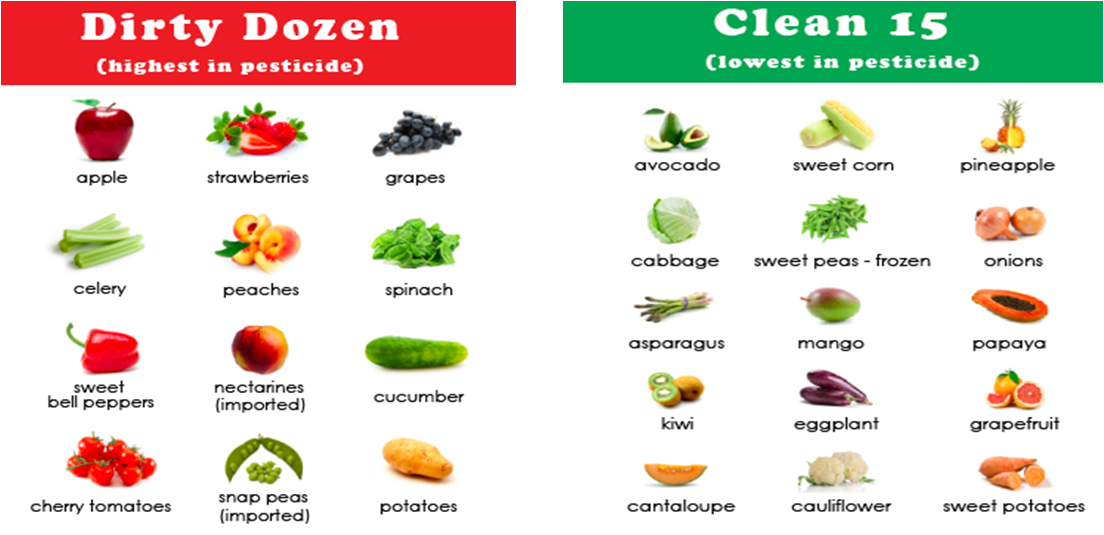by Louise Powell, Waco Founder Lions Club Vision Screening Chair
This summer, the Waco Founder Lions Club is pleased to announce our partnership with Allergan Foundation. Prevent Blindness Texas, other Waco area Lions Clubs, and the optometry practice of Dr. Robert Salganik to improve the vision of Central Texans. At the recent groundbreaking of Waco’s Allergan plant expansion, the Allergan Foundation gave the Waco Founder Lions Club a grant to provide 100 no-cost eye exams to Waco area people who don’t have the money or insurance to cover eye exams.
Why 100 exams? The Waco Founder Lions club celebrates its 100th birthday July 2016 (with a huge street party on July 15, 2015 at Lions Park), and Lions International will celebrate its 100th birthday in 2017. Allergan Foundation has chosen to honor the Centennial Anniversary of both the Waco Founder Lions Club and Lions International because, like Allergan, the Lions are dedicated to vision preservation. Since 1925, the Lions’ primary focus has been on vision-related projects. That year—1925–Helen Keller challenged Lions International to become “Knights for the Blind.” Through the years, Lions have recycled donated eye glasses, distributing the refurbished glasses to people all over the world. We have trained service dogs and provided Braille materials for the blind, operated eye banks for corneal transplants, combatted river blindness in Africa and Latin America, and conducted vision screenings in local communities.
Why are no-cost professional eye exams important? Many adults cannot afford eye exams for themselves or their children. Health insurance doesn’t always cover eye exams. Lots of folks don’t have separate vision insurance. And Medicare will not cover routine eye exams for glasses. Lions have discovered these facts as we travel about the community providing vision screenings. When our screenings with our fantastic new Spot Vision Screener reveal a vision problem, we advise clients to make an appointment with an eye care professional, but often they will tell us they can’t afford the exam. Now we can tell our friends that the Lions Club can help them—through the generosity of our partners.
Why is partnership important in preserving the sight of Wacoans? With the help of our partners, we have more people and more money dedicated to vision preservation in Central Texas. For years, optometrist Dr. Robert Salganik of Optical Dispensary has provided discounted eye exams for referrals from Waco Founder Lions Club, but our Waco Founders Lions Club budget was limited to about 50 eye exams a year. With Allergan’s grant, this year we can provide 100 more Wacoans no-cost exams. Another partner, the non-profit organization Prevent Blindness Texas, will continue to cooperate with Lions clubs in vision screenings and provide additional vouchers for no-cost eye exams and glasses for adults who qualify. In addtion, local area Lions Clubs cooperate in providing vision screenings to the community and referring people for eye exams.
What does a Vision Screening by Lions Club look like? You have to see it to believe it! The Waco Founder Lions Club has purchased a high tech vision screening camera that within seconds “takes a picture” which can identify the following serious eye conditions in a child or adult: nearsightedness, farsightedness, astigmatism, and pupil and gaze abnormalities. Results are printed automatically and given to the client; if a problem is detected, a printout (in red) advises “Complete Eye Exam Recommended.” In over 1600 screenings this past year, approximately 20% of the children and adults received a recommendation for an eye examination by an optometrist or ophthalmologist.
Why is this 20% important? Children from the age of 6 months to 5 years of age are often called the “underserved population” because parents do not realize the importance of a complete eye exam in these early years. In fact a child’s first eye exam should be at 9 months (according to the American Optometric Association and American Ophthalmological Association). Babies and young children don’t know they can’t see, so they don’t tell their parents that anything is wrong. Unfortunately, if a vision disorder such as “Lazy Eye” is not detected and corrected early, permanent vision loss can occur. Poor vision can also affect early learning and beginning reading efforts. Schools conduct annual screenings; however, many children unnecessarily suffer from poor vision for several years before they begin school. Vision disorders stand a chance of correction without surgery if detected at an early age.
If you are interested in scheduling a vision screening– which can be arranged for day cares, health fairs, churches, schools, recreation centers, or community festivals/events—call the Lions Club. Vision screening for the citizens of the Waco area is a service project of the Waco Founder Lions Club and other area Lions Clubs.
Contact Numbers: Louise Powell (409) 392-4671 or Waco Founder Lions Club Office (254) 776-5341 –office open Mon-Thurs. 9:00-1:00 –leave a message or e-mail [email protected]
You can find more information about Spot Vision Screening at this website: Spot Vision Videos.
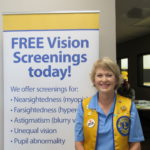 Louise Powell is currently an adjunct English instructor at Baylor and MCC. Previously she was an English teacher and administrator in Waco I.S.D. She is married, the mother of three grown children and grandmother to six (and one on the way). Louise is a past president of Waco Founder Lions Club and currently serves as Vision Screening Chair. Waco Founder Lions Club is the oldest continuously operating Lions Club in the world. We will be 100 years old this July 2016. To learn more about the Waco Founder Lions Club, be our guest any Wednesday at lunch, 12:00 at the Lions Den, 1716 N. 42nd St.
Louise Powell is currently an adjunct English instructor at Baylor and MCC. Previously she was an English teacher and administrator in Waco I.S.D. She is married, the mother of three grown children and grandmother to six (and one on the way). Louise is a past president of Waco Founder Lions Club and currently serves as Vision Screening Chair. Waco Founder Lions Club is the oldest continuously operating Lions Club in the world. We will be 100 years old this July 2016. To learn more about the Waco Founder Lions Club, be our guest any Wednesday at lunch, 12:00 at the Lions Den, 1716 N. 42nd St.
he Act Locally Waco blog publishes posts with a connection to these aspirations for Waco. If you are interested in writing for the Act Locally Waco Blog, please email [email protected] for more information.
(Note: This post is part of a series called “Entrepreneurs of Waco.” The series is collaboration between the McLennan Small Business Development Center (SBDC), the Professional Writing program at Baylor University, and Act Locally Waco. The McLennan Small Business Development Center offers technical assistance, business mentoring, training, and resources for all stages of small business. For more information, visit their website: www.mccsbdc.com. To see all the posts in this series, click here: Entrepreneurs of Waco. – ABT)
by Hailey Nelson
 “Photography is an art form, and everyone has their own unique touch,” says Aaron Jetelina, or AJ, the proprietor of WTX Media. This is the main reason AJ works alone. Photographers have their own fingerprints on the photos, especially when it comes to editing, and the difference can usually be seen in the final product.
“Photography is an art form, and everyone has their own unique touch,” says Aaron Jetelina, or AJ, the proprietor of WTX Media. This is the main reason AJ works alone. Photographers have their own fingerprints on the photos, especially when it comes to editing, and the difference can usually be seen in the final product.
For AJ, it all started in high school when his photography teacher left suddenly, and AJ began taking over all of his teacher’s photographing responsibilities. He started out photographing football games and sports events, but that slowly morphed into taking over the rest of the school’s events. Today, AJ’s photography hobby has grown into a well-known business. Beyond finding something you’re good at, he says, “You have to find your niche, because it’s so important to be unique in this business and have focus. There are many new photographers out there, but if you find something interesting, like pet photography or newborn photography, you’re sure to receive more business.”
AJ found his “niche” while taking pictures for a few local dance studios. He realized the typical process that has been used for decades in school and sports photography, does not work with dance photography. When photographing a dance studio one must account for the multiple outfits dancers have, and you need to be able to accommodate a variety of poses. Parents want to see their child’s portraits before making purchasing decisions. AJ developed a new system in order to meet his customer’s needs. Instead of parents pre-paying for pictures without seeing their images, Aaron uses multiple computers as viewing stations. After the dancer finishes his or her photography session, the images are viewable on the computers to help in making purchasing decisions. Along with his professionalism and experience, this innovative way of making sales has enabled AJ to grow his client base to over 20 dance studio across Texas. Last year he photographed over 1000 dancers – which equates to 3000 outfits and 20,000 poses/images – all in the span of 10 weeks.
AJ is now using his knowledge of dance photography to develop a training program to help other photographers across the country learn how to be successful in this very specific photography niche. “I figure I can’t work in more than one state at a time,” he says. With the training program, other photographers can learn to use AJ’s process to expand their businesses.
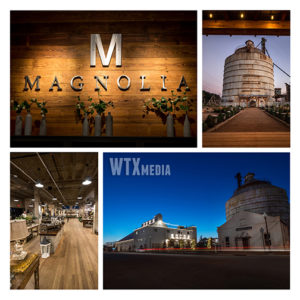 AJ’s interest in developing efficient business processes goes back to college where he earned a business degree. Since AJ started his photography business in junior high, he already had quite a bit of knowledge about photography by the time he entered college. He decided that earning a degree in business would be beneficial in continuing his career. AJ’s business degree and his expertise in photography programs have both been integral to his success. For instance, he uses editing programs such as Photoshop and Lightroom to fix minor cosmetic issues such as teeth whitening, and to do major editing such as full background changes, postermaking and more. He spent over seven years mastering these two editing systems, and has been able to use this to his advantage when it comes down to setting himself apart. “Everyone wants the perfect Pinterest shot. They see photos of perfect sunset weddings and immediately assume that’s how it’ll work. When in reality, it takes a massive amount of editing to get those.” This is only part of the reason that photographers can be expensive. It takes two hours to edit every one hour of shooting. So a full eight-hour wedding, can take sixteen hours or more to complete all the basic edits.
AJ’s interest in developing efficient business processes goes back to college where he earned a business degree. Since AJ started his photography business in junior high, he already had quite a bit of knowledge about photography by the time he entered college. He decided that earning a degree in business would be beneficial in continuing his career. AJ’s business degree and his expertise in photography programs have both been integral to his success. For instance, he uses editing programs such as Photoshop and Lightroom to fix minor cosmetic issues such as teeth whitening, and to do major editing such as full background changes, postermaking and more. He spent over seven years mastering these two editing systems, and has been able to use this to his advantage when it comes down to setting himself apart. “Everyone wants the perfect Pinterest shot. They see photos of perfect sunset weddings and immediately assume that’s how it’ll work. When in reality, it takes a massive amount of editing to get those.” This is only part of the reason that photographers can be expensive. It takes two hours to edit every one hour of shooting. So a full eight-hour wedding, can take sixteen hours or more to complete all the basic edits.
Another reason for the cost is that photography is an art. It’s like selling a painting or a movie. It’s something that can never be recreated the same way, and the artist takes pride in his or her work. This is especially evident when the photographer gives away the printing rights to customers. Typically photographers will have a second meeting with their clients where they select the photos they’d like to keep, and they are only allowed to print through the photographer. For his clients, AJ creates a flat rate depending on what they want done; then he provides all of the edited pictures on a flash drive for the customers to use as they please. It’s another innovation, and it has drawn many customers. “The world is relying so much more on technology than it used to, and no one wants the photos printed anymore, they want to put them on Facebook or Instagram,” he says.
AJ’s photographs also appear on Google; he is the only Google photographer between Dallas and Austin. No, he isn’t the guy who rides around in the car. He takes panoramic business images that appear on Google. These help businesses advertise, and they help customers get sense of what a place looks like when they search online. AJ’s experience and his vast array of equipment, including a camera with panoramic capabilities and a swivel tripod that allows the camera to move in a complete circle, helped him land the Google job. AJ owns several cameras and a multitude of different lenses that enable him to capture images from a great distance or up-close and in detail. In other words, he’s prepared because he knows no two photo-shoots are ever the same.
One thing that is the same is Waco, or at least AJ in Waco. He graduated high school here and returned here after college to continue his business. “I grew up here, and the best part is I get to do what I love and capture moments in people’s lives that they can cherish for years to come.”
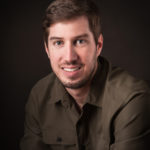 The entrepreneur…Aaron Jetelina started out his career in photography back in 2000 photographing portraits and events. Over the years he has developed the skills and knowledge in working with companies to meet their specific branding and marketing needs. He graduated from Sam Houston State University in 2007 with a bachelors in business administration and management.
The entrepreneur…Aaron Jetelina started out his career in photography back in 2000 photographing portraits and events. Over the years he has developed the skills and knowledge in working with companies to meet their specific branding and marketing needs. He graduated from Sam Houston State University in 2007 with a bachelors in business administration and management.
 The writer…Hailey Nelson is a secondary education major with a concentration in English. She has moved around to five different states, but Texas is her favorite. She is a semi-pro photographer and loves animals more than anything. Baylor is her second home. She is a member of both Kappa Delta Pi honors society and Alpha Delta Pi sorority.
The writer…Hailey Nelson is a secondary education major with a concentration in English. She has moved around to five different states, but Texas is her favorite. She is a semi-pro photographer and loves animals more than anything. Baylor is her second home. She is a member of both Kappa Delta Pi honors society and Alpha Delta Pi sorority.
The Act Locally Waco blog publishes posts with a connection to these aspirations for Waco. If you are interested in writing for the Act Locally Waco Blog, please email [email protected] for more information.
by Joel H. Scott
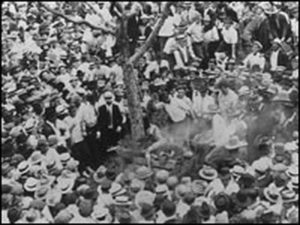 The Jesse Washington memorial service was a confluence of feelings for me. It was sobering, enlightening, liberating, divine… and it made me feel fragile. While I found myself wooed by the rhythmic interplay of words of lament and declarations of faith, (a faith that overcomes the longstanding shadows of hatred and egregious forms of violence), internally, I was struck by my feelings of fragility about my place at this service. I know I represent, both symbolically and historically, a form of unchecked dominance and power to underrepresented populations in this country. I’ve known this for a long time, but it is still uncomfortable for me. Rather than sit with my insecurity, I still prefer to focus on how much “progress” I’ve made in the past 15 years of work toward becoming a more “culturally competent educator.”
The Jesse Washington memorial service was a confluence of feelings for me. It was sobering, enlightening, liberating, divine… and it made me feel fragile. While I found myself wooed by the rhythmic interplay of words of lament and declarations of faith, (a faith that overcomes the longstanding shadows of hatred and egregious forms of violence), internally, I was struck by my feelings of fragility about my place at this service. I know I represent, both symbolically and historically, a form of unchecked dominance and power to underrepresented populations in this country. I’ve known this for a long time, but it is still uncomfortable for me. Rather than sit with my insecurity, I still prefer to focus on how much “progress” I’ve made in the past 15 years of work toward becoming a more “culturally competent educator.”
So during my intermittent discomfort throughout the service, I found myself thinking things like: “Yes, but this [lynching] happened 100 years ago. So much progress has been made this century…” and other similar self-soothing thoughts in response to my internal dissonance. This kind of thinking is what emerging scholars such as Robin DiAngelo describe as a form of “white fragility.” White fragility prevents empathic listening from occurring in critical discourse regarding equity and inclusion. Well-intentioned discussions addressing the delicate issues of racism, power and privilege are too often met by defensiveness, guilt, or the need to qualify, benchmark, or point to progress—all of which smell suspiciously like shame-avoidance.
This isn’t just occurring individually (as in my case at the memorial service), but institutionally. For example, during the service representatives of Waco were offered times to apologize to the family and community. The corporate declarations of “I’m sorry” turned quickly to descriptions of the new “progressive” Waco. In my opinion, these statements subtly overlooked the gravity of this occasion. And, while Waco may not hold egregious rallies today such as the one in 1916, our community, and our country, continues to trip itself up with “fear-of-the other” behaviors and attitudes that “disembody” people of color. Ta-Nehisi Coates describes this phenomenon poignantly in his recent book, Between the World and Me. Look no further than existing policies and practices that continue to disproportionately impact minority groups: the historic bias of standardized testing, the mass incarceration of African-American men, for-profit detention centers, predatory loan businesses, and the persistent misogyny and institutional racism plaguing many of our “prestigious” universities and organizations. All these things are part of an unfortunate mindset rooted in fear and fragility.
 Look, as a white male of current and historic privilege, I get it. No judgment here if you feel fragile when facing these truths. It’s uncomfortable to sit with these feelings without offering words of hope for humanity or citing current breakthroughs, especially when the event in question happened 100 years ago. But herein lies the tension: In order for personal transformation to stir, Critical Race and White Identity Development theories point to the need for living fully into this tension — without the crutch of self-serving cliché’s and well-intended suggestions. Living into this cognitive, moral, and spiritual tension is work!
Look, as a white male of current and historic privilege, I get it. No judgment here if you feel fragile when facing these truths. It’s uncomfortable to sit with these feelings without offering words of hope for humanity or citing current breakthroughs, especially when the event in question happened 100 years ago. But herein lies the tension: In order for personal transformation to stir, Critical Race and White Identity Development theories point to the need for living fully into this tension — without the crutch of self-serving cliché’s and well-intended suggestions. Living into this cognitive, moral, and spiritual tension is work!
- It means empathically listening to friends directly impacted by bias and prejudice.
- It means admitting to ourselves and others that we have biases (a natural human behavior , but one that becomes violent if it goes unchecked).
- It means working toward a deeper understanding of the ways we support prejudice and bias of all kinds through ignorance or silence.
- It means facilitating conversations with our children regarding their friendships and who they may intentionally or unintentionally exclude at school or church.
- It means studying culture, language, and/or music that we may not be naturally drawn to or interested in.
- If you are a Christian, it means wrestling with social gospel realities and inclusion at church.
- It means gently yet firmly redirecting or confronting conversations that are rooted in sweeping generalizations and fear-based perspectives.
People much smarter than I am who study racial reconciliation agree: to develop cultural competencies that can lead a city, a church, or an organization to greater equity, inclusion, and redemption is to live deeply into this tension. As such, I’m grateful for the privilege of attending the memorial service, grateful to be starkly reminded again of my own fragility. Writing this piece for ALW is one of a number of cathartic experiences I have had of late (including responding to my 10 year-old son’s questions about privilege, fear and violence in response to the Waco Horror and service) that are humbling reminders that I still have much to learn and do on the journey toward redemption.
*For a richly uncomfortable account of the Jesse Washington tragedy, I encourage all Wacoans to read The Waco Horror by Jesse Washington at http://theundefeated.com/features/the-waco-horror/
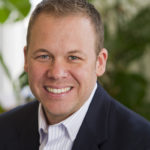 Joel Scott most recently served on faculty at Boston University. His scholarship is anchored in moral development with an eye toward higher education reform. After four years of commuting and 300,000 flyer miles, his family has decided to remain full-time in Waco. Joel is currently re-rooting, looking forward to backyard barbeques, driveway basketball, and living a more integrative life.
Joel Scott most recently served on faculty at Boston University. His scholarship is anchored in moral development with an eye toward higher education reform. After four years of commuting and 300,000 flyer miles, his family has decided to remain full-time in Waco. Joel is currently re-rooting, looking forward to backyard barbeques, driveway basketball, and living a more integrative life.
The Act Locally Waco blog publishes posts with a connection to these aspirations for Waco. If you are interested in writing for the Act Locally Waco Blog, please email [email protected] for more information.
by Destiny Fernandez
In 2009, I was a quiet, goofy, friendly sophomore at University High School. I was a soccer player, a JROTC cadet, a member of the color guard, a cheerleader, and an absolutely terrible softball player. I enjoyed my friendships, took care of business in academics, and intentionally surrounded myself with community. All the while, no one knew of my homelessness. I wasn’t trying to hide it from others so much as I was trying to hide it from myself. It was painful, frustrating, and discouraging if I thought about it for too long.
On the outside, I seemed to be doing great. On the inside, I wrestled with frustration as I coped with what was happening at home. One Saturday morning, officers entered my home and flipped everything upside down…my belongings, my life. We lost everything. My stepfather went to prison on drug-related charges, and from that point on, life for us was never stable. We moved often, with family members and friends. At times, my mother, brothers, and I were separated.
Although what happened was painful – and is difficult to remember, and difficult to share — I hope that it is a reminder to be patient and loving with people. It’s true that you never know the battles they are facing. Despite changing, unstable situations, I still went to school with a smile on my face (a little blue fish told me to “just keep swimming”). Most days, that smile was genuine; other days, that smile was there because it was better than answering anyone who would ask, “What’s wrong?” You might wonder how I managed to hold it together when life was falling apart. When I look back, I can’t believe it myself.
What I can say is that I was surrounded with people that cared for, loved, and encouraged me. Although in some ways I was broken, they didn’t treat me like I was. Through every encouraging word, breaking of bread together, and moment of laughter, they unknowingly helped me pick up the shattered pieces of my life. “Homeless” is a painful, stigmatizing, and shameful word to use to define yourself. However, I am willing to own it only to encourage. To encourage students like me to see that life can get better. To encourage others to see the impact that is made when a student is surrounded with support, love, and encouragement on their journey. Each of our students has individual gifts, talents, and goals that need to be nurtured and believed in. They should have no doubt that they are important. They are valued. They are loved. I am where I am today because others believed in me; they said I could, so I did.
Today I have two college degrees sitting on my bookshelf: a bachelor’s degree from Texas A&M University and a master’s degree from Baylor University. I haven’t taken them out of the tubes because they’re difficult to look at. When I look at them, I’m reminded that my story is sometimes considered an exception. It shouldn’t be. I don’t want it to be. In the state of Texas, and across the nation, the homeless youth graduation rate is 25%. In Waco ISD last year, 100% of homeless seniors graduated. That should attest to the incredible resiliency, strength, and ability of our students.
Every student, including those experiencing homelessness, has unique gifts, talents, interests, passions, goals, and dreams. They should feel cared for, valued, and empowered enough by those around them to relentlessly pursue those dreams. Someone in my life was crazy enough to tell me that I was called, equipped, chosen, set apart, loved, and that all I needed was a mustard seed of faith to move mountains. I am so thankful for each person in my path that prepared the soil, helped me to plant, water, fertilize, give sunlight to, and nurture that mustard seed.
So many people have heard my story and in retrospect have said, “I wish I knew then; I had no idea…I could’ve helped; I could have done something.” To which my response has been, “well, you can now.” You can do something to support and love on our youth experiencing homelessness in Waco by supporting The Cove. The Cove is a teen nurturing center designed to provide a safe space for student experiencing homeless to access the resources they need to thrive. It is an amazing place that will provide the care, opportunity, value, and empowerment that students like me need to walk in all that they were created to be. I urge you to support the Cove in any way that you can.
In order to open our doors to these deserving students this fall, we need to raise funds. The Cove has set a goal of $300,000 by December 2016. It is imperative for the well-being of our students and of our community. From the bottom of my heart, THANK YOU. To the countless people who helped change the trajectory of my life: THANK YOU. My life has not been the only one you’ve changed.
The Cove is a teen nurturing center designed to provide a safe space for student experiencing homeless to access the resources they need to thrive. The Cove’s mission is to empower and equip youth experiencing homelessness. The Cove is truly a community effort to care for some of the most vulnerable youth in Waco. There are lots of ways you can join us. Check out our Philanthropy and Volunteer pages for more information. To learn more, to get involved or to donate, please visit the website: www.thecovewaco.org.
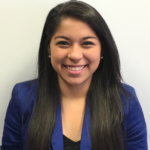 Destiny Fernandez is a Waco native. She graduated from Texas A&M in 2014 and recently received her Master of Social Work degree from Baylor. She is passionate about education reform and hopes to make a difference in Texas education. To connect with Destiny, email: [email protected]. To learn more about and/or donate to the Cove, visit: www.thecovewaco.org.
Destiny Fernandez is a Waco native. She graduated from Texas A&M in 2014 and recently received her Master of Social Work degree from Baylor. She is passionate about education reform and hopes to make a difference in Texas education. To connect with Destiny, email: [email protected]. To learn more about and/or donate to the Cove, visit: www.thecovewaco.org.
The Act Locally Waco blog publishes posts with a connection to these aspirations for Waco. If you are interested in writing for the Act Locally Waco Blog, please email [email protected] for more information.
By Brittany Fitz-Chapman
Data doesn’t have to be scary or overwhelming. If you think about it, you have been using data your entire life to assess your well-being. For example, for every assignment you completed in school you were awarded a grade. At the end of high school, you were given your class rank based on your grade point average. When you feel sick, you take your temperature. Data has been informing your decision making process for a long time. You can use data at a community-level, as well. Data enables us to assess the well-being of our community and allows us to measure the impact programs and organizations are having.
Prosper Waco has been tasked with monitoring the health and well-being of our community through a series of data points, or what data people call “indicators.” Just like changes in body temperature may signal that you are getting sick, changes in community-level indicators suggest how healthy we are as a community.
When you are sick, your first reaction is to treat the symptoms, right? Let’s say you have a stuffy nose from allergies. You will go to H-E-B, use some Vicks rub and hope you get better. But, to cure the stuffy nose from allergies, you’ll need to go to your doctor and get allergy medicine. Prosper Waco community partners, organizations, community members and all others involved in the community-wide initiative ultimately want to treat the causes, not just the symptoms of our community’s health. The indicators we monitor allow our steering communities, working groups and community partners to treat the causes.
 For example, community members, organizations and leaders in Waco decided to make school readiness a priority, and the Prosper Waco Education Steering Committee developed a measurable goal for our community—to increase the percentage of Kindergarten-ready students by 50 percent by 2020. The working group has collaboratively discussed different projects, programs and initiatives they can all rally behind to help address this goal. One initiative community partners are rallying behind is Vroom. Vroom is an app that you can download on your smartphone, tablet (be sure to select “iPhone-only” apps!), or computer that provides daily, age-appropriate brain building activities adults can do with children ages 0-5 to help prepare them for Kindergarten. Each activity is paired with an explanation of the science behind the activity, allowing the adult to understand how that specific activity is developing the brain of the child.
For example, community members, organizations and leaders in Waco decided to make school readiness a priority, and the Prosper Waco Education Steering Committee developed a measurable goal for our community—to increase the percentage of Kindergarten-ready students by 50 percent by 2020. The working group has collaboratively discussed different projects, programs and initiatives they can all rally behind to help address this goal. One initiative community partners are rallying behind is Vroom. Vroom is an app that you can download on your smartphone, tablet (be sure to select “iPhone-only” apps!), or computer that provides daily, age-appropriate brain building activities adults can do with children ages 0-5 to help prepare them for Kindergarten. Each activity is paired with an explanation of the science behind the activity, allowing the adult to understand how that specific activity is developing the brain of the child.
Within the Prosper Waco working group that is focused on Kindergarten readiness, affiliate organizations have been collaborating and talking about other ways they can all work together to help create a culture of family engagement that prepares children to thrive when they enter the classroom. One example is a partnership between Waco ISD and the Mayborn Museum. They are developing a free Science Night for the children and families in our community. This Science Night will allow families to interact with their children at the museum, discuss the different exhibits and experience everything the museum has to offer! Using data from the school readiness monitoring tool, WISD and the Mayborn Museum can tailor the educational content of these nights, and they can use the data to help target their efforts on school campuses that may be struggling in the science content area.
The Prosper Waco initiative tracks indicators around our three impact areas – education, health and financial security. To find out more about how our community is doing, read our 2015 Greater Waco Community Indicators Scorecard and attend our 2016 Summit Event in September where you will get a copy of our Community Baseline Report. I look forward to seeing all of you and would love to talk data with you!
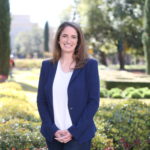 Brittany Fitz-Chapman works at Prosper Waco as the Director of Data and Research. She is a graduate of Baylor University. She holds two master’s degrees and is pursuing her PhD in Sociology at Baylor. She has engaged in community research in Waco and has published professional articles about what makes communities strong. She enjoys exploring Waco with her husband and their two puppies!
Brittany Fitz-Chapman works at Prosper Waco as the Director of Data and Research. She is a graduate of Baylor University. She holds two master’s degrees and is pursuing her PhD in Sociology at Baylor. She has engaged in community research in Waco and has published professional articles about what makes communities strong. She enjoys exploring Waco with her husband and their two puppies!
The Act Locally Waco blog publishes posts with a connection to these aspirations for Waco. If you are interested in writing for the Act Locally Waco Blog, please email [email protected] for more information.
by Kiera Boone
It’s no secret that people are starting to become more health conscious. With all the documentaries on fast food (i.e. SuperSize Me and Forks over Knives) and the BuzzFeed Facebook videos on fried delicacies and bacon covered treats, it’s hard to choose between what TASTES good and what IS good. So, to try to bridge the gap between taste and nutrition, it has become a trend for people to lean toward more organic products. These are products that are grown without the use of pesticides, synthetic fertilizers, sewage sludge, genetically modified organisms, or ionizing radiation. Choosing organic products also means animals that produce meat, poultry, eggs, and dairy products do not take antibiotics or growth hormones. Basically, going “organic” means that people must be more aware of the nutrition labels on products they buy when they go grocery shopping and try to get more fresh products. Although fertilizers, pesticides, and bioengineering can be productive for agricultural yields, the chemicals from those items may not be the best for our bodies in the long-run.
Why should I buy organic products?
Although we may want to eat healthier and choose organic items when grocery shopping sometimes it is not as easy as it seems. For example, organic foods are more expensive in general. Paying an extra dollar or two, may not seem like a big deal to some, but to others, that difference is often avoided. Another reason many people stray from organics is because they don’t know the benefits organic products can have. Why buy organic, when the same fresh product it cheaper and a lot bigger? Well, here are a few reasons why organic products can be worth the extra buck:
Benefit From More Nutrients! – It has been studied and proven that organically grown foods are substantially more nutritious. They contain more nutrients that we need such as vitamins, minerals, enzymes, and micronutrients. Furthermore, studies have also shown that five servings of organically grown vegetables like lettuce, spinach, and carrots have more Vitamin C than the same amount of conventionally grown veggies!
Avoid Harmful Chemicals! – Many conventional fruits and vegetables are grown with the use of lots of fertilizers and pesticides. More than 600 active chemicals are registered for agricultural use in America! The crazy thing about the many chemicals being sprayed on crops is that the Environmental Protection Agency (EPA) allows it. Many of the chemicals in the fertilizers and pesticides are approved by the EPA. Organic foods are free of those chemicals.
Avoid GMOs! – Genetically engineered foods and genetically modified organisms are saturating grocery stores all around us. GMOs, or “genetically modified organisms” are living organisms whose genetic material has been artificially manipulated in a laboratory through genetic engineering. The main problem with GMOs is that genetic engineering can sometimes add carcinogens in some foods. Carcinogens increase the risk for cancers. Buying organic products helps reduce the risk of GMOs.
A Guide to Shopping Organic
The Dirty Dozen
Whenever possible, buy these foods organic to avoid potential high levels of pesticide residue.
|
|
The Clean Fifteen
These are the foods that are okay to buy conventional when necessary because they have low levels of pesticide residue.
|
|
 Kiara Boone is an Atlanta, Georgia, native who is graduating from Baylor University with a Community Health degree. She is currently interning at the Waco McLennan County Public Health District. She enjoys cooking PINTEREST recipes, tough workouts, and writing poetry in her spare time. Contact Info: Kiara Boone, [email protected].
Kiara Boone is an Atlanta, Georgia, native who is graduating from Baylor University with a Community Health degree. She is currently interning at the Waco McLennan County Public Health District. She enjoys cooking PINTEREST recipes, tough workouts, and writing poetry in her spare time. Contact Info: Kiara Boone, [email protected].
The Act Locally Waco blog publishes posts with a connection to these aspirations for Waco. If you are interested in writing for the Act Locally Waco Blog, please email [email protected] for more information.
By George Eichenberg, bass player, Rising Sons
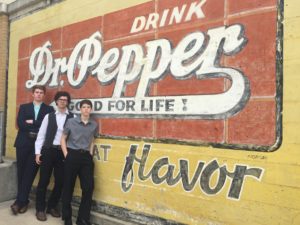 When my friends and I started a band three years ago, I never thought that one day I’d be packing my bags and my bass guitar and going on the road. But five days from now, Spencer Davis, Jackson Anderson and I — otherwise known as the Rising Sons trio — will be heading southeast to play gigs in Louisiana, Mississippi, Alabama and Florida in what we’ve dubbed our 2016 Gulf Coast Tour.
When my friends and I started a band three years ago, I never thought that one day I’d be packing my bags and my bass guitar and going on the road. But five days from now, Spencer Davis, Jackson Anderson and I — otherwise known as the Rising Sons trio — will be heading southeast to play gigs in Louisiana, Mississippi, Alabama and Florida in what we’ve dubbed our 2016 Gulf Coast Tour.
Going on tour sounds pretty cool, but we’re not exactly living the rock-n-roll lifestyle just yet. Our tour bus is a caravan of family cars. We’re not expecting crowds of screaming girls to rush the stage. And our venues don’t seat thousands of people. But that doesn’t make any of this less real or less important to us. We take seriously our job of performing the classic rock, jazz and country tunes that will entertain audiences near, and now, far.
What started out as just messing around on Friday nights has turned into a real paying job with pretty consistent income that has given me the ability to save money, upgrade my equipment and go out with my friends. That wouldn’t be possible without owners of restaurants like the Hippodrome, Manny’s and Jake’s Texas Tea House taking a chance on some teenage boys and their electric instruments — and hiring us again and again once they realize we’re serious about what we do.
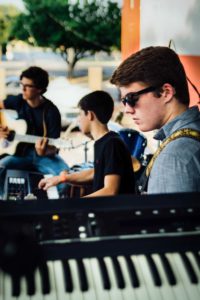 But more importantly, being part of the band — and spending many weekend nights playing music — has given me the opportunity to be part of something. You see, Spencer and Jackson have been playing music all their lives, but I didn’t pick up the bass until 7th grade music class. Outside of school, Jackson practiced with me and I started to understand how the bass adds another layer and gives every song a fuller sound — and how my contributions to the music make us better as a group.
But more importantly, being part of the band — and spending many weekend nights playing music — has given me the opportunity to be part of something. You see, Spencer and Jackson have been playing music all their lives, but I didn’t pick up the bass until 7th grade music class. Outside of school, Jackson practiced with me and I started to understand how the bass adds another layer and gives every song a fuller sound — and how my contributions to the music make us better as a group.
We’ve all worked hard to get here. And though we’ve had lots of help from our parents, we’ve put in a lot of our own sweat. From hours of perfecting every note of our favorite Eagles tune to hauling heavy gear to and from our gigs (now in our own cars — two of us are finally driving!), it’s not easy. We’ve felt everything from love and support to skepticism and doubt. But at the end of the day, when our Algebra teacher and his wife show up to hear us (OK, maybe it was also for the chicken fried steak) at a roadhouse 20 miles outside of town, we know we’re doing something right. When strangers start tapping their feet to the music and singing along, we might be onto something. We’re definitely having fun.
Now we’re taking it on the road. The t-shirts have been printed, the UHaul has been rented and our kick-off party plans have been made. The three of us are looking forward to playing for new audiences and picking up the musical influences of the southern coast. Are we under the illusion that this tour is going to make us famous or that we are going to be discovered? Nah. But as we head out this weekend, we’ll be keeping Waco in the rear view mirror and remembering it’s the good people of our hometown who helped us pave the way.
June 3 – Rising Sons 2016 Gulf Coast Tour Send-Off Party – Join Waco’s favorite teen trio and celebrate their June 4-12 2016 Gulf Coast Tour at this pre-tour performance and party. Cost: Free admission (not including food and drinks at Jake’s). Time: 6 PM – 9 PM. Location: Jake’s Texas Tea House, 613 Austin Ave. For more information please visit the website: www.ehandersonpr.com/rising-sons
 George Eichenberg is the bass player for the Rising Sons, a Texas teen trio that plays everything from the Eagles to John Mayer and lots in between. George is a junior at Vanguard College Preparatory School and when he’s not playing bass, you can probably find him on the court with the varsity basketball team at school. His parents are Alex and Gretchen Eichenberg; and he has a sister, Brigitte, 13, and a big chocolate Lab named Luke.
George Eichenberg is the bass player for the Rising Sons, a Texas teen trio that plays everything from the Eagles to John Mayer and lots in between. George is a junior at Vanguard College Preparatory School and when he’s not playing bass, you can probably find him on the court with the varsity basketball team at school. His parents are Alex and Gretchen Eichenberg; and he has a sister, Brigitte, 13, and a big chocolate Lab named Luke.
The Act Locally Waco blog publishes posts with a connection to these aspirations for Waco. If you are interested in writing for the Act Locally Waco Blog, please email [email protected] for more information.
According to the Project Link website, “Project Link is a new local program that started in Fall 2015 to help Waco-area high school students, currently at La Vega High School and University High School, and their families in charting a more assured and successful post-secondary journey through intense one-on-one college, career, and financial advising… At the high schools, the Project Link team works to create a college-going culture by developing an environment that recognizes the value of higher education, by building awareness of post-secondary resources, and by nurturing student’s individual college and career aspirations.” If you have questions about Project Link, feel free to contact Natalie James at [email protected] or at 254-299-8517. In today’s Act Locally Waco blog post, two Project Link participants share the positive impact this new program is having on their success as first generation college students.
by Carlos Gonzalez and Alexandria Aleman
 My name is Carlos Gonzalez, and I recently completed my second semester at TSTC. When I first got to TSTC, I was lost, but it’s kind of hard to remember now because I now know where everything is located, and one of the Success Coaches helped me with choosing my career path and major. The first semester went well, but my second semester started off a little different, because when I needed more help the Success Coach I was used to seeing no longer worked in that department. However, as luck would have it, I was contacted by Brandon Chappell, the Project Link Outreach Specialist at TSTC. I remember I was expecting someone much older when he contacted me, but luckily it’s easier for me to relate to him because he’s closer to my age. He was offering to help me with some of my college struggles basically anytime I needed him. We’ve talked about my grades, he’s helped me practice for a job interview, and when I noticed at the beginning of the semester I could not afford my textbooks, Brandon helped me to get 3 of my most expensive textbooks for free.
My name is Carlos Gonzalez, and I recently completed my second semester at TSTC. When I first got to TSTC, I was lost, but it’s kind of hard to remember now because I now know where everything is located, and one of the Success Coaches helped me with choosing my career path and major. The first semester went well, but my second semester started off a little different, because when I needed more help the Success Coach I was used to seeing no longer worked in that department. However, as luck would have it, I was contacted by Brandon Chappell, the Project Link Outreach Specialist at TSTC. I remember I was expecting someone much older when he contacted me, but luckily it’s easier for me to relate to him because he’s closer to my age. He was offering to help me with some of my college struggles basically anytime I needed him. We’ve talked about my grades, he’s helped me practice for a job interview, and when I noticed at the beginning of the semester I could not afford my textbooks, Brandon helped me to get 3 of my most expensive textbooks for free.
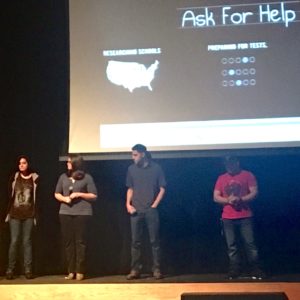 I am a first generation college student, so I was excited to be in college, but I had a lot of questions. Brandon has been there to address a lot of my concerns and given me the opportunity to volunteer on a student panel to speak about my experiences as a first generation college student with some of the Project Link students still in high school. I think Project Link is very helpful. Brandon has been able to help me get a better understanding of the things that happen on campus. To me, Project Link just wants to help the students do their best and succeed in college.
I am a first generation college student, so I was excited to be in college, but I had a lot of questions. Brandon has been there to address a lot of my concerns and given me the opportunity to volunteer on a student panel to speak about my experiences as a first generation college student with some of the Project Link students still in high school. I think Project Link is very helpful. Brandon has been able to help me get a better understanding of the things that happen on campus. To me, Project Link just wants to help the students do their best and succeed in college.
I definitely think Project Link will be beneficial for me in the future to explore different career opportunities as well. I know I can always use Project Link if I have questions about financial aid or any other aspect of college. I appreciate the help I have been getting from Brandon Chappell. He is a very good person to talk to. Even though he can be annoying when he bugs me about my grades, he seems like a fun person to hang out with too.
 My name is Alexandria Aleman. I am a graduate of La Vega High School and have recently completed my second semester at McLennan Community College. Project Link at MCC has been a safety net for me. I try to stay involved with the workshops and events so that it gives me more experience in how college life works. I feel like having this extra help has given me the confidence to keep on track with my career, because it provides me with crucial information about what is happening on campus and how it can benefit us.
My name is Alexandria Aleman. I am a graduate of La Vega High School and have recently completed my second semester at McLennan Community College. Project Link at MCC has been a safety net for me. I try to stay involved with the workshops and events so that it gives me more experience in how college life works. I feel like having this extra help has given me the confidence to keep on track with my career, because it provides me with crucial information about what is happening on campus and how it can benefit us.
As a first-time-in-college and first generation student at McLennan Community College, I have learned a lot about how the real world works, but Project Link has expanded my knowledge further by introducing me to an environment where I do not feel alone or unwelcome. The program has helped me make meaningful connections with other people who are going through the same thing. I’ve been fortunate enough to meet some wonderful peers that are willing to help each other with anything.
I have also experienced a few events where it has helped me build on my public speaking 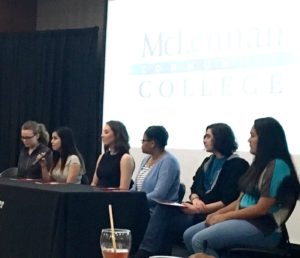 skills. For example, I was part of a student panel that answered questions and shared experiences with other students who will soon be entering the same environment. It helped me practice my public speaking, and I was able to meet some amazing people.
skills. For example, I was part of a student panel that answered questions and shared experiences with other students who will soon be entering the same environment. It helped me practice my public speaking, and I was able to meet some amazing people.
In college, there will be times when you will need help or advice, and Project Link has the right person to help. I have always felt that I can go to her to know what I need to do to get my work done. Whatever I may need she makes sure I get it.
Project Link has provided a lot of workshops that prepare you for anything that comes your way. The workshops range from balancing your finances to taking good notes and have all been very helpful to me. Being in college and having a lot of freedom after high school is amazing but it can be easy to procrastinate and get off track. In the beginning, I felt like I was off track a bit, but with Project Link, I was able to get the help I needed to get back on track.
What has been most helpful is the open, caring and kind Project Link Coordinator, Mrs. James, who makes talking to someone easy. She is there for all her students, and she makes you feel at home. It is like making another friend because talking to her doesn’t feel like speaking to another person in charge. There is truly a family in the making and I hope that one day my sisters can take part of this wonderful program.
Project Link is not just another college readiness program; it is a family — a family that is always there for you with help and things that will benefit you in the long run. I don’t regret being part of this program; I make good use of what is given to me, and that is the knowledge and experience of the real world.
 Carlos Gonzalez is a second-semester student at TSTC. He is a graduate of La Vega High School and is double-majoring in Instrumentation and Electrical Power and Control. After college, he plans on having a good job and being able to help his family financially and possibly exploring other careers.
Carlos Gonzalez is a second-semester student at TSTC. He is a graduate of La Vega High School and is double-majoring in Instrumentation and Electrical Power and Control. After college, he plans on having a good job and being able to help his family financially and possibly exploring other careers.
 Alexandria Aleman is a recent graduate of La Vega High school, and a current college student at McLennan Community College. Alexandria is pursuing her Associates in general academics until she can transfer to Tarleton State University in the Spring of 2016. At Tarleton she plans to earn her Bachelors in Psychology, and then her Masters and PHD at Baylor University. She is attending college to give her parents, sisters and herself a better life.
Alexandria Aleman is a recent graduate of La Vega High school, and a current college student at McLennan Community College. Alexandria is pursuing her Associates in general academics until she can transfer to Tarleton State University in the Spring of 2016. At Tarleton she plans to earn her Bachelors in Psychology, and then her Masters and PHD at Baylor University. She is attending college to give her parents, sisters and herself a better life.
The Act Locally Waco blog publishes posts with a connection to these aspirations for Waco. If you are interested in writing for the Act Locally Waco Blog, please email [email protected] for more information.
By Diego Loredo
I’ve finally finished my first two years of college. For most college students, the first two years are a transition period where you’re still getting used to the college life. Afterwards, it’s when you really have to get serious about college and thinking about what will happen after graduation.
My first two years at UNT have been pretty crazy. I’ve lived in a dorm for my freshmen year but moved into an apartment this school year. I’ve met so many great people and made my own little group of friends who I hang with all the time. I took part in intramural sports such as soccer and football and I got to see what kind of city Denton really is. But after these two years, what next? For me, what’s next is a long and bumpy road to graduation.
First of all, I need to get serious with my classes. My GPA has dropped and I’m going to have to bring it back up. I’m also going to have to think about getting experience in the career that I want to pursue as well as networking with people to get connections so that I can have someone to look to when I’m looking for a job. I also plan on studying abroad next summer so I will need to save up money for that. There’s so much that will be going on these next two years and I would be lying if I said I wasn’t intimidated by it all.
Regarding getting experience, I have already worked with a nonprofit called Minnie’s Food Pantry in Plano where I worked as a communications expert. I have made a communications plan, a fact sheet, an infographic, a feature story, and a media list for them to use. This was all done in two classes, which was great because it provided me with all of this experience. Plus, my professor had us all make an online portfolio, complete our resume, and create business cards to ensure that we are prepared. I’m really grateful to my professor for that and I know that they will come in handy down the road. I plan on doing community or media relations as a career (preferably in sports PR) and working with Minnie’s has provided me with valuable insight that I know will be useful.
Although working with Minnie’s was fun, I’m the most excited about getting the chance to study abroad. UNT offers opportunities to students to study abroad and take classes while also learning about the different cultures there. For me, I think my options are Japan and England. England is my first choice because I’ve always wanted to travel there but also because I’m a huge soccer fan (I’m a Manchester United fan) and traveling to see the different soccer stadiums there would be great. I decided to get a job this summer to start saving up for studying abroad next year.
So as you can see, I have a lot in store for me for my final two years at UNT. I may even graduate a semester early because of the college credits I got during my senior year in high school. But I’m pretty sure I’ll be taking my time and will probably end up graduating in the Spring of 2018 because I don’t want to rush myself.
As for advice for other college students, new or current, it’s to enjoy your first two years of college. Use that time to get out and experience that “college life.” Join organizations, meet new people, play intramural sports, or just go around and see what your city is like. Because after those two years, that’s when you really have to take not only college seriously but what your future career will be like. I’m not saying that the last two years of college will be boring, but it’s best to use it to focus more on college and your future career.
I’ve learned so much these past two years and I like to think I’ve matured a bit. I know what to do and what not to do and I know about the stresses of juggling college, social life, and personal life together. I also know what I need to do to succeed in my career field, which is crazy because I never thought I would get to this point a few years back. I know it’s going to be tough but I also know that I have the support of my friends and family to help me get through it all.
 Diego Loredo is a sophomore at the University of North Texas. He is majoring in public relations. He graduated from University High School in 2014. Although he is still not quite sure what exactly he wants to do, he thinks he wants to work somewhere in sports PR (preferably soccer or college football). His hobbies include playing soccer and golf. He is 19 years old.
Diego Loredo is a sophomore at the University of North Texas. He is majoring in public relations. He graduated from University High School in 2014. Although he is still not quite sure what exactly he wants to do, he thinks he wants to work somewhere in sports PR (preferably soccer or college football). His hobbies include playing soccer and golf. He is 19 years old.
The Act Locally Waco blog publishes posts with a connection to these Aspirations for Waco. If you are interested in writing for the Act Locally Waco Blog, please email [email protected] for more information.
By Lucas Land
One summer, when I was in college, I worked at a Lutheran camp in the Rocky Mountains. The camp had a high population of what has come to be called “crunchy” types. Many of my peers at this camp were vegetarians. Now, I grew up in Texas and can’t remember a meal from my childhood that didn’t have meat in it. I wasn’t sure about giving up meat, but I was inspired by their passion for social justice and their faith.
So, mostly as an experiment, that Christmas I decided to give up meat and try a vegetarian diet. I was really nervous that it might make me sick. I had never NOT eaten meat. But I didn’t get sick. I didn’t wither away or become too weak to stand. Then I read Fast Food Nation by Eric Schlosser on a plane to Japan to visit my girlfriend, now wife. I thought to myself, “I keep finding more reasons to be vegetarian. I think I’ll stick with it.” I was vegetarian for nine years after that.
Lest you think my newfound diet bestowed some sort of righteousness on me, let me say that I was (and am) pretty lazy when it comes to food. I might have thought a lot about food, but when it came to the act of satisfying my hunger at any given moment a frozen pizza worked as well as anything (and was vegetarian too).
My little experiment with vegetarianism led me to ask more questions about what I was eating, where it came from, and what that meant for myself, other people and the planet. It’s a rabbit trail I’m still traveling down. The trail has connected up with a lot of other trails along the way, as I realized that the way our food is produced is connected to so many issues.
If you care about women’s issues, you should care about agriculture. The majority of the world’s farmers are women. If you care about immigration, then you should think about the conditions of those who are growing and harvesting your food. If you care about poverty, you have to think about what kind of food is available to people in food deserts like East Waco, and how that affects rates of obesity and diabetes.
Thinking about the food we eat is an entry point to thinking about a lot of different issues. This is what led me to leave a comfortable life with a house payment and steady income and move with my wife and two young kids to World Hunger Relief, Inc. (WHRI) for their internship program. I know the next step in my own journey is controversial among some vegetarians, vegans and environmentalists, but after moving to WHRI I felt like I could start eating meat again. I knew the animals that fed me and the conditions they were raised in. I was willing to butcher them which was (and still is) an emotional, difficult, and meaningful experience.
Reducing or eliminating your consumption of meat is still one of the best things you can do to reduce your carbon footprint and to combat climate change. A recent article from Salon spells out the link between meat consumption and climate change. The difference for me now when I eat local meat, or chickens that I’ve raised, is that I’m more mindful and connected to the source and consequences of what I’m eating. I could dedicate a whole other article just to this topic (and maybe I will).
What I realized through my own journey is that raising our consciousness and awareness of these issues is the most important and perhaps hardest part of working towards sustainability. Our year at the farm was one of exploring, learning, and deepening our commitment to a more sustainable world related to food, agriculture and every area of our lives. Ultimately, sustainability is about finding ways for humans to thrive alongside the rest of the ecosystems and environments that make up our habitat. This requires us to be more aware of the way the food we eat, and other aspects of our lives that we take for granted, affect the climate and environment, from our local watershed to the interconnected global system that sustains life on this planet we call home.
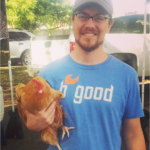 Lucas Land is an eco-theologian, urban farmer, activist, aspiring master naturalist, facilitator, musician, and writer. He is avoiding growing up by constantly learning and trying new things. He also works in Grants Management for Waco ISD. He lives with his wife, three children, flock of chickens, dog, and cat in the Sanger Heights Neighborhood in North Waco.
Lucas Land is an eco-theologian, urban farmer, activist, aspiring master naturalist, facilitator, musician, and writer. He is avoiding growing up by constantly learning and trying new things. He also works in Grants Management for Waco ISD. He lives with his wife, three children, flock of chickens, dog, and cat in the Sanger Heights Neighborhood in North Waco.
The Act Locally Waco blog publishes posts with a connection to these aspirations for Waco. If you are interested in writing for the Act Locally Waco Blog, please email [email protected] for more information.

